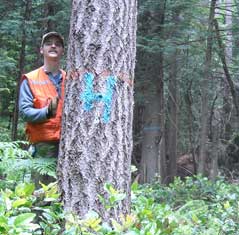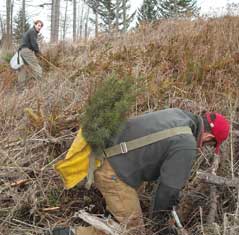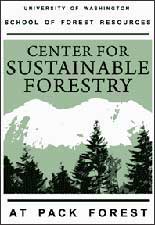 |
||||||
| Forest Resources Home | News | Make a Gift | UW Alumni | ||||||
|
April 2011 | Return to issue home
Pack Forest: a Center for Student Learning, Collaborative Research
In 1926, conservationist and East Coast lumberman Charles Lathrop Pack bequeathed a generous monetary gift enabling the UW to buy 334 acres of forested land near Eatonville, Wash., and establish the Charles Lathrop Pack Experimental Forest as a resource for forestry research and demonstration. In 1929, the first class of UW forestry students tossed their bedrolls and notebooks into newly constructed cabins at Pack. Eighty-five years later, the forest, now 4,300 acres and home to the Center for Sustainable Forestry at Pack Forest (CSF-PF), provides students, faculty, professionals and the public with valuable educational and research opportunities and demonstrations of forestry and ecological processes in action. Although budget cuts have eliminated the staff educator position, a reduced outreach program continues with graduate student assistance and provides guided forest tours and public education tailored to age level and program need. CSF-PF also provides conference facilities and often hosts events, most recently a climate change workshop for the National Park Service’s Mount Rainier National Park, a Student Leadership meeting of the Ecological Society of America’s Strategies for Ecology Education, Diversity and Sustainability (SEEDS) program and a National Science Foundation–funded workshop on the role of natural history in education. Student involvement has always been a goal for Pack Forest, and for more than 70 years, Pack has provided a forested classroom for SFR students, faculty and researchers. For many years, forest management undergraduates spent a quarter of their academic year in residence; this requirement has been discontinued, but lab exercises and case studies are still conducted at Pack. For example, faculty members David Ford and Eric Turnblom bring silviculture students to Pack—Turnblom’s students get lessons in tree planting and constructing a riparian management zone (to meet Washington’s forest practices requirements), and Ford’s students mark a thinning. This year SFR graduate students led a "forestry introduction weekend" for a large UW biology class. Associate Professor Gregory Ettl, ’95, who serves as CSF-PF director, leads the Graduate Student Field Orientation at Pack Forest at the beginning of each autumn quarter and uses the forest for his Community Forest Ecology course.
Ettl is charged with ensuring the fiscal sustainability of Pack Forest in these challenging budgetary times. Working with the Washington Parks and Recreation Commission, he has secured grant funding to hire forest ecologist Chris Raynham, ’04, ’09, in a joint appointment. The position provides benefits to both organizations: Raynham helps with Pack Forest day-to-day operations and oversees the work of SFR students while Etti is on the UW campus, and develops forest health plans and treatments for Washington’s state parks. These have included prescriptions to reduce fire risk and restore native species composition and structure at Riverside State Park, and thinning prescriptions at Mt. Spokane, Nisqually and Seaquest state parks. The agreement has allowed training for four students this year, including two students who are completing the Society of American Foresters-accredited Master of Forest Resources degree. “The collaboration," Etti says, "has been fantastic. State parks benefit from on-the-ground treatments to improve forest health, and we benefit from Raynham’s expertise, an outcome that would be unlikely with a part-time appointment. I’m hopeful that this collaboration, worked out over the last few years with Washington state parks chief of stewardship and SFR affiliate Robert Fimbel, will survive the legislative budget process. "Over the last two years we’ve tried some innovative approaches that I think will strengthen and better manage our forest, our programs and SFR teaching and research," he adds. "The most important change we’ve made is to shift management activities from staff to students wherever possible. Undergraduate and graduate students are once again spending time helping maintain the forest and its infrastructure." CSF-PF has employed at least one graduate student at Pack continuously since last summer—Paul Fischer, Nate Hough-Snee, ’10, and Trevor Walter helped with coursework, including creating forest practices applications and marking stand boundaries. Last summer, a group of students led by Walter completed 140 forest inventory plot surveys, performed trail maintenance, assessed and mapped culverts for forest road maintenance and provided assistance with SFR faculty research projects involving Ettl, Renata Bura, Sharon Doty, Tom Hinckley, Soo-Hyung Kim, Sergey Rabotyagov and Sandor Tóth.
The students collected data for a Shiitake mushroom project, watered and maintained an NSF-funded endophyte study, measured standing and downed woody debris that will serve as the basis of a USDA habitat modeling project and established a new sap flow measuring system. The group logged 2,012 total hours, including over 725 volunteer hours. This year Ettl initiated a "Spring Break at Pack Forest Interns" program and he, Fischer and Raynham led a group of undergraduate students in planting over 3,500 seedlings as infill on seven previously planted sites. Says Ettl, "The revival of student work at Pack Forest has entered a new phase and it’s good to have them back!" Alumni support will help these projects continue in the coming years. This year, the William A. Eastman Endowment for Student Support funded a spring intern and will continue to be used in this way. The Eastman endowment was established in 2005 in memory of William Eastman, ’33, by his wife, Alice, to honor his commitment to the profession of forestry and to continue his support for Pack Forest. Field trips were also supported by a gift from Dick Hopkins, ‘72, who continues to bring his talented Green River Community College students to Pack Forest. "This summer we’ll have at least three summer interns working at Pack," Etti says. "We have lots of work for students in the forest and will continue to field train as many students as we can afford. We are even looking into bringing back international forestry students to Pack with visa applications in process for a student from the University of Copenhagen." April 2011 | Return to issue home | ||||||
|
||||||


